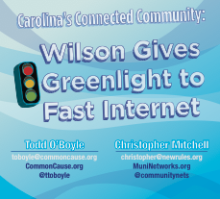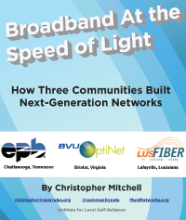Wilson's Greenlight Leads North Carolina in Fast Internet
Image

Following the collapse of key industries, a town of 50,000 in eastern North Carolina had to make a hard choice. It wanted to support existing businesses and attract new ones but the cable and telephone companies were not interested in upgrading their networks for cutting edge capacity.
So Wilson decided to build its own fiber optic network, now one of the fastest in the nation, earning praise from local businesses that have a new edge over competitors in the digital economy. In response, Time Warner Cable lowered its prices and modestly boosted available Internet speeds, contributing to the $1 million saved by the community each year.
Download Carolina's Connected Community: Wilson Gives Greenlight to Fast Internet here.
The Institute for Local Self-Reliance and Common Cause have just released a case study of how and why Wilson built Greenlight, a citywide next-generation fiber-to-the-home network that set the standard for connectivity in North Carolina. The report is authored by Todd O'Boyle of Common Cause and Christopher Mitchell of the Institute for Local Self-Reliance.
The network, owned and operated by the municipal utility, offer telephone, television, and Internet services to every resident or business in the city. Over 6,000 households and businesses have subscribed, a take rate of over 30% and growing. Additionally, the network has connected all of the schools with at least 100 Mbps connections. Downtown has free Wi-Fi and the library has benefited with a higher capacity connection for people looking for jobs and taking computer classes.
The Federal Communications Commission ranks North Carolina last in the nation in percentage of households subscribing to at least a "basic broadband" service, largely because Time Warner Cable, CenturyLink, and AT&T have declined to upgrade their networks to modern standards. Only 13% subscribe to a connection that is at least 4 Mbps downstream and 1 Mbps upstream -- the minimum required to take advantage of basic Internet applications according to the FCC.
This story was originally posted on the ILSR website.
This report is the first of two.


